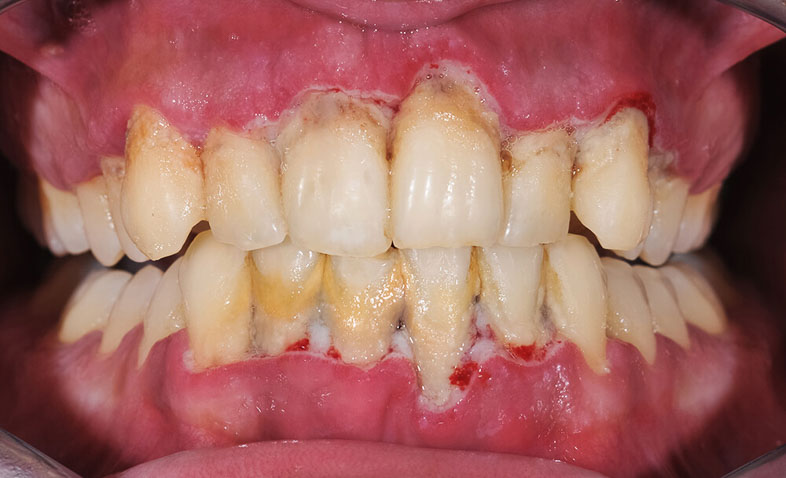People are generally advised to visit the dentist every six months for a bi-annual cleaning and exam. However, your dentist may recommend that you visit every four months. Although this might seem concerning, there are several reasons that you might need to visit the dentist more frequently. Our dental professionals explain why you might have been asked to see your dentist every four months.
Prevent Gum Disease
If you brush and floss on a regular basis, you will be much less likely to develop gum disease. For people who practice good oral hygiene at home, you will probably only need to see your dentist every six months. However, your dentist may recommend that you make an appointment every four months if you’re experiencing gum sensitivity, your gums are bleeding or other gum disease symptoms.
For others who may struggle to keep up with good oral hygiene habits, gum disease is a common problem. Seeing your dentist every four months for a thorough teeth cleaning, exam and x-rays will help you stay on top of dental issues and prevent advanced gum disease.
Help Treat Bad Breath
You may also need to see the dentist more often if you suffer from bad breath. Bad breath is not just an embarrassing problem. It can also be a sign of poor oral hygiene, infections and tooth decay. Bad breath is caused by an overgrowth of bacteria in the mouth, which is concerning for your overall health.
A professional teeth cleaning can remove bacteria from hard-to-reach areas of the mouth that you could easily miss just from brushing and flossing alone. Your dental hygienist will also use special tools to remove plaque and calculus buildup from your teeth that also contribute to bad breath. This is why you may need cleanings every four months if you’re having difficulty keeping up with oral hygiene and controlling bad breath.
RELATED: 6 Ways Your Dentist Can Help With Bad Breath
You Are a High-Risk Patient
There are some people who are at a greater risk for developing oral problems than others. For example, if you are a smoker, then your chances of developing gum disease will be a lot higher than a non-smoker. There are several ways that smoking or using other tobacco products can put you at risk for developing dental issues.
Patients who have dementia, rheumatoid arthritis, physical or mental disabilities, and some types of cancer are also more likely to develop gum disease. These conditions can make it harder for someone to brush and floss their teeth regularly. This could be another reason your dentist recommends more frequent visits.
According to the Centers for Disease Control and Prevention (CDC)1, other patients who may be considered at high risk of developing gum disease may suffer from:
- Diabetes
- Immuno-deficiencies, such as AIDS
- Crooked teeth
- Dry mouth
- Bridges that do not fit properly
- Hormonal changes due to pregnancy or hormone therapy
- Side effects from medication that could increase risk of periodontal disease
Your Teeth Are Prone to Staining
Even if you brush and floss every day, plaque can still build up, causing your teeth to become stained. For others, you may indulge in coffee, dark sodas, wine or other food and beverages that cause discoloration. If your smile is not as bright and white as it could be, your dentist may suggest that you have your teeth cleaned every four months rather than six months.
You may also want to consider a professional whitening treatment while at your dentist’s office. Depending on the treatment, you may be able to do this every time you have your teeth cleaned. Talk to your dentist about the best whitening treatment for you.
Detect Oral Cancer
Oral cancer is a serious condition. According to the Nation Cancer Institute2, 60 percent of people who have oral cancer will survive five years after their diagnosis. However, if the cancer is localized and has not spread to other parts of the body, then a person has an 83 percent chance of surviving. Detecting oral cancer early is key to successful treatments and improving survival rates.
Dentists can detect oral cancer with an in-office oral cancer screening. Not only can early detection save your life, but it can also eliminate the need for more invasive treatment. If you have a high risk of developing oral cancer due to alcohol and tobacco use, a family history of oral cancer or if you’ve had an oral cancer diagnosis in the past, your dentist may ask you to visit every four months for screenings.
When to Visit Your Dentist Every Four Months
Although you have likely been told that you should go to the dentist every six months, your dentist may recommend that you go every four months. Everyone’s oral health is different, so the general recommendation does not always work for everyone. If you have oral health concerns, then four-month checkups may be recommended for you. It is also a good idea to go to the dentist more often if you want to maintain a bright white smile.
The dentists at Absolute Dental encourage patients to take control of their oral health and request more frequent visits if they think they’ll benefit from additional preventative care. Also, if you’re experiencing any issues, including toothaches or sensitivity, call your dentist right away to make an appointment rather than waiting for your routine exam. Remember, even minor dental problems can quickly become worse if you ignore them.
1 Centers for Disease Control and Prevention (CDC). Periodontal Disease. Retreived 2 March 2021
2 National Cancer Institute. Cancer Stat Facts: Oral Cavity and Pharynx Cancer. Retrieved 2 March 2021 from https://seer.cancer.gov/statfacts/html/oralcav.html


